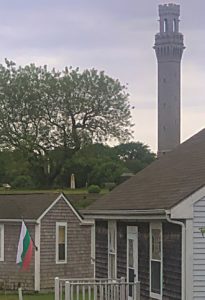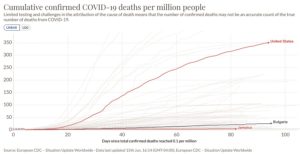PROVINCETOWN — The Outer Cape is not a highly diverse place. When it comes to sexual orientation, Provincetown has a higher concentration of LGBTQ people than almost anywhere — but beyond that, racial, religious, and national-origin diversity is low. The primary engines that bring diversity to the Outer Cape are two visa programs that allow non-Americans to work here seasonally.
The J-1 Summer Work Travel program is designed as a cultural exchange, and in a normal year it brings about 700 international college students to the four Outer Cape towns, most of them from Bulgaria, according to U.S. State Dept. figures. The H-2B is a labor program that lets employers apply to fill specific seasonal positions with overseas workers, and for decades now, hundreds of Jamaicans have traveled from their island to the Cape to work here in the summer and fall.
Although in both countries the number of Covid-19 cases has been far lower than in the U.S., the virus crisis has disrupted the two programs differently. The result is that there will be very few college students from Eastern Europe this year, but there will be people coming from Jamaica to work here under the H-2B program.
A Perfect Storm for J-1

The Summer Work Travel program is built around the academic calendar, and the coronavirus outbreak was perfectly timed to disrupt it. In 2019, almost 90 percent of the J-1 visas originating in the U.S. embassy in Bulgaria were issued in March, April, and May, according to State Dept. records. Participants mostly arrive in May and June, and they’re obligated to be done working by the last week of September. (Participants are allowed one month after their last workday to travel in the U.S.)
This tight schedule was blown apart by the pandemic. The State Dept. suspended routine visa services worldwide on March 20. A fair number of J-1 visas had already been issued by that date, the records show — almost a quarter of Bulgaria’s number for the prior year. But even for those students with visas in hand, there are reasons not to come.
Travel from Bulgaria to America is not restricted, but it is made difficult by a maze of new border controls imposed after the outbreak. Most of the normal transit points are in the “Schengen zone” (named after a 1985 treaty signed in Schengen, Luxembourg, which eased trade and established common visas among 26 European countries, though not yet including Bulgaria), which is now subject to travel restrictions. Some of Bulgaria’s own borders are closed, including the one with Turkey. The easiest path from Bulgaria to Boston right now runs through Belgrade, Serbia.
“I know some students who took the bus from Sofia to Belgrade, and then the direct flight to New York, and then to Boston,” said Antoni Slavimirov, co-owner of the Agency for International Mobility, which recruits students into the J-1 program. “Ninety percent of the students are deciding not to go. It’s too late, there’s not much time to work, and it’s very expensive to fly.
“The students who do go, it will not be the first-year students,” added Slavimirov. “It will be the ones that have come before, who know they have a good job.”
H2s Are Essential
The White House made several loud announcements about restricting immigration and travel during the pandemic. Tucked away in a quiet part of the State Dept.’s website, however, are these words from March 26: “The H-2 program is essential to the economy and food security of the United States and is a national security priority. Therefore, we intend to continue processing H-2 cases as much as possible.”
That corner of the government’s website went on to state that consular officers “can, if they so choose, now waive the visa interview requirement for first-time and returning H-2 applicants … We anticipate the vast majority of otherwise qualified H-2 applicants will now be adjudicated without an interview.”
Thus, in reality, H-2 arrangements were actually being encouraged at the federal level, rather than restricted, as the current president advertised. Technically, H-2B visas were suspended for five days between March 20 and 26. At that point, it was up to each embassy to decide how to proceed.
The U.S. embassy in Jamaica announced that it would begin using the expanded interview waiver rules on May 18. Indiana Hutchison-Willis, owner of Faith Placement Services, a visa facilitation agency in Jamaica, confirmed that the embassy has actually been releasing H-2B visas since then.
There would have been 300 to 500 people traveling to the Outer Cape on H-2Bs in 2020 had the pandemic not happened. Businesses in the Outer Cape towns submitted applications for 509 employees, though not all of those applications would have made it through the employer lotteries.
It’s hard to say exactly how many will travel here in this strange year. It’s clear, however, that the path here from Jamaica is much more open than the path from Bulgaria. Flights from Jamaica to America have also been easier to come by. A Kingston to Miami to Boston flight can be had for under $400.

The problem may come down to fear — not of visa and travel logistics, but of the health hazard a job in the U.S. represents for those arriving from less-infected countries. Jamaica has had 617 cases of coronavirus total, and 10 deaths, in a population of three million. Massachusetts has had 105,000 cases, and 7,538 deaths, in a population of almost seven million.
Put another way, Jamaica has experienced 21 cases per 100,000 people, and Massachusetts has experienced 1,533 cases per 100,000 people. That means Massachusetts has 73 times the case density that Jamaica has. People from Jamaica put themselves in danger when they come to work here. Statistically, we are the bearers of illness, not our guests.
From the employers’ point of view, at least the timing of the pandemic has been much kinder to the H-2B program than it was to J-1. The U.S. embassy in Jamaica normally releases half the season’s allotment in May, June, and July, according to State Dept. records. People who travel on H-2B are allowed to stay for six months or more, and can continue working through September, October, and November.
If Jamaicans do risk coming, they can stay for months in which many local business owners are placing great hope this year.



